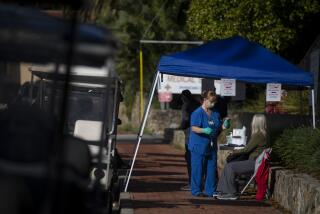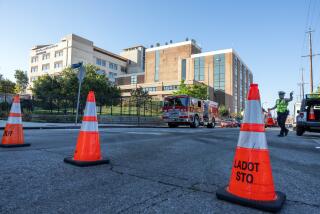San Diego hospital suspends heart transplants
UC San Diego Medical Center announced Friday that it was voluntarily shutting its heart transplant program — at least temporarily — amid a federal review of transplant centers that fall below performance standards.
“It is a very difficult decision for all of us here,” said Alexander Aussi, the hospital’s transplant administrator.
UC San Diego’s heart program, which opened in 1990, performed just four transplants last year, down from 10 the year before. To obtain federal funding, a center must perform at least 12 heart transplants a year. That threshold is intended to ensure that centers perform enough procedures to remain proficient.
The hospital’s action comes as the U.S. Centers for Medicare and Medicaid Services is scrutinizing the performance of heart, liver and lung transplant programs nationwide.
The agency began its review last March after The Times asked questions about its oversight. In June, the newspaper reported that a fifth of the 236 federally funded centers had subpar patient survival rates or performed too few operations to ensure competency. UC San Diego was one of them.
Since then, the government has notified six heart transplant programs that their federal funding may be pulled because they performed too few transplants. (Some also had subpar survival rates.)
The hospitals — which include Sutter Memorial Hospital in Sacramento — all have said they intend to make changes to meet Medicare standards. So far, none has lost funding.
Several other heart programs have voluntarily withdrawn from Medicare.
In October, for instance, St. Vincent Medical Center in Los Angeles closed its program. It too had not performed enough transplants to meet Medicare’s standard. The center said it also was hurt by a scandal in its liver transplant program, which chased off insurers.
Nine heart programs serving adults remain in California, and UC San Diego’s closure is not expected to diminish patients’ access to heart transplants in the region.
UC San Diego had said earlier that it was committed to keeping its heart program open. In November, Dr. Stuart Jamieson, the hospital’s head of cardiothoracic surgery, vigorously defended his program’s performance and questioned whether volume had anything to do with competency.
“Very few centers would still be in business if you applied those strict numbers,” Jamieson said, referring to the Medicare requirement.
The hospital had submitted a “comprehensive action plan” to the Medicare agency to increase the number of transplants it performed. But progress was slower than expected, Aussi said, and administrators came to believe that suspending the program would give them time to figure out a solution.
One option is teaming with the heart program at cross-town rival Sharp Memorial Hospital, which is slightly larger. Sharp performed 11 transplants in each of the last three years — also below the federal threshold.
Sharp officials said they were open to finding training opportunities for the university’s fellows and residents. Sharp also is willing to grant qualified UC San Diego heart surgeons privileges to practice there.
“Really, the community could be best served in terms of having one program instead of two,” said Dan Gross, executive vice president of Sharp HealthCare Hospital Operations.
Gross said the two hospitals already operate a joint bone-marrow transplant program.
UC San Diego’s decision affects six heart patients on its waiting list, but four of them are not currently eligible for an organ. Patients on the waiting list have been notified and will be transferred to other hospitals.
Post-transplant patients and those receiving care for heart failure will not be affected, Aussi said. “We don’t have any intention to just drop the ball on any of those patients,” Aussi said.
UC San Diego will continue to operate its lung, heart-lung, kidney and liver transplant programs.
charles.ornstein@latimes.com
tracy.weber@latimes.com
More to Read
Sign up for Essential California
The most important California stories and recommendations in your inbox every morning.
You may occasionally receive promotional content from the Los Angeles Times.










